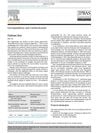 4 citations,
April 2021 in “Journal of Cosmetic Dermatology”
4 citations,
April 2021 in “Journal of Cosmetic Dermatology” Botulinum toxin may help hair loss by increasing blood flow and reducing harmful factors.
 68 citations,
May 2021 in “Endocrine”
68 citations,
May 2021 in “Endocrine” People with diabetes or obesity should manage their conditions carefully as they have a higher risk of severe COVID-19.
October 2022 in “Journal of Drugs in Dermatology” Combining PRP and laser treatments improves hair density best for androgenetic alopecia.
[object Object]  April 2023 in “Revista colombiana de reumatología”
April 2023 in “Revista colombiana de reumatología” JAK inhibitors like tofacitinib can effectively treat severe alopecia areata.
 June 2018 in “Exchanges: The Warwick Research Journal”
June 2018 in “Exchanges: The Warwick Research Journal” Advertising mixes truth and imagination to persuade consumers that products are essential.
1 citations,
February 2022 in “Brain Research Bulletin” Finasteride may help reduce impulsivity caused by pramipexole.
6 citations,
June 2015 in “Journal of theoretical biology” The model showed that immune system guardians and the cytokine interferon-γ are key in alopecia areata progression.
 2 citations,
May 2023 in “Experimental dermatology”
2 citations,
May 2023 in “Experimental dermatology” New imaging techniques can assess and track changes in mouse acne without harm, aiding treatment choices.
February 2020 in “Pharmacoepidemiology and Drug Safety” Finasteride users have higher odds of certain health issues and lower odds of specific lifestyle factors compared to nonusers.
 July 2024 in “International Journal of Women’s Dermatology”
July 2024 in “International Journal of Women’s Dermatology” Many Hijabi women worry about hair loss, but fewer actually experience it.
 2 citations,
February 2024 in “Journal of the European Academy of Dermatology and Venereology”
2 citations,
February 2024 in “Journal of the European Academy of Dermatology and Venereology” The study created a 27-item measure to assess the impact of skin diseases.
 October 2023 in “Cognizance journal”
October 2023 in “Cognizance journal” The document suggests using natural remedies like bloodletting and honey for various health issues but lacks scientific evidence for their effectiveness.
 January 2010 in “프로그램북(구 초록집)”
January 2010 in “프로그램북(구 초록집)” Fgf9 helps create new hair follicles after injury through skin T cells.
 11 citations,
August 2013 in “Facial Plastic Surgery Clinics of North America”
11 citations,
August 2013 in “Facial Plastic Surgery Clinics of North America” Tissue expanders effectively repair large scalp defects and restore a natural-looking scalp.
 January 2017 in “Journal of Plastic Reconstructive and Aesthetic Surgery”
January 2017 in “Journal of Plastic Reconstructive and Aesthetic Surgery” The authors suggest using scalp hair follicles for beard reconstruction to improve results and reduce surgery time and patient discomfort.
[object Object]  1 citations,
October 2022 in “Curēus”
1 citations,
October 2022 in “Curēus” Diagnosing simple-virilizing congenital adrenal hyperplasia can be difficult and requires thorough testing and expert advice.
 8 citations,
April 2020 in “Facial Plastic Surgery Clinics of North America”
8 citations,
April 2020 in “Facial Plastic Surgery Clinics of North America” Follicular Unit Transplantation is a reliable hair restoration method with a high success rate and minimal scarring.
 July 2019 in “Journal of Aesthetic Nursing”
July 2019 in “Journal of Aesthetic Nursing” The JCCP's Premises Standards aim to make non-surgical cosmetic treatments safer and higher quality.
 August 2022 in “Archives of pediatric surgery”
August 2022 in “Archives of pediatric surgery” Hair-Thread Tourniquet Syndrome is a rare condition where hair or thread tightly wraps around a child's body part, requiring quick treatment to prevent damage.
 June 2022 in “Journal of the turkish academy of dermatology”
June 2022 in “Journal of the turkish academy of dermatology” The COVID-19 quarantine in Turkey disrupted dermatological care, increased stress-related skin issues, and showed the need for psychological support and teledermatology.
 July 2019 in “Facial Plastic Surgery Clinics of North America”
July 2019 in “Facial Plastic Surgery Clinics of North America” New techniques and technologies are improving facial plastic and reconstructive surgery.
 1 citations,
October 2021 in “Gene, cell and tissue”
1 citations,
October 2021 in “Gene, cell and tissue” Grape sap may help reduce hair loss and promote hair growth in rats.
2 citations,
March 1989 in “International Journal of Dermatology”  April 2014 in “Medical Clinics of North America”
April 2014 in “Medical Clinics of North America” Accurate diagnosis and tailored treatment are crucial for managing common primary care symptoms.
 January 2012 in “Yearbook of Dermatology and Dermatologic Surgery”
January 2012 in “Yearbook of Dermatology and Dermatologic Surgery” Acne treatment, including isotretinoin, improves quality of life and does not worsen depression.
 1 citations,
October 2017 in “Dermatologic Surgery”
1 citations,
October 2017 in “Dermatologic Surgery” More men are getting cosmetic treatments to look young and stay competitive at work.
 July 2024 in “Clinical Cosmetic and Investigational Dermatology”
July 2024 in “Clinical Cosmetic and Investigational Dermatology” Exosomes can help promote hair growth and may treat hair loss.
 20 citations,
November 2012 in “Journal der Deutschen Dermatologischen Gesellschaft”
20 citations,
November 2012 in “Journal der Deutschen Dermatologischen Gesellschaft” Hair diseases can have psychological effects and should be treated with a combination of psychosomatic care, therapy, and medication.
83 citations,
August 2018 in “BJOG” Uterine transplants for transgender women are feasible but need more research.
 September 2022 in “Journal of Cosmetic Dermatology”
September 2022 in “Journal of Cosmetic Dermatology” Hair casts may be a useful clue for diagnosing hair loss during the resting phase of hair growth.
























